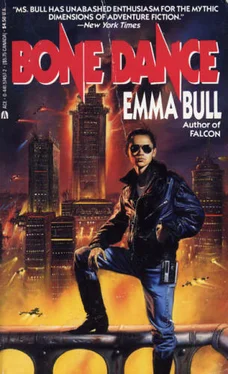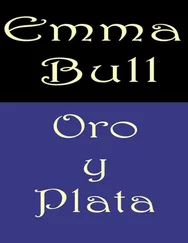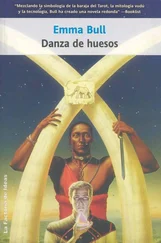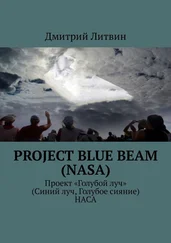4.0. What friends are for
…And came back up, easy as a swimmer who rises, breaks the water’s surface, and opens eyes and mouth to the air. I opened mine to the night. I heard the churning, guttering sound of water moving over something; smelled a faint odor of dead fish, beer, perfumes, and old smoke; and saw row after row of little electric lights, swinging vigorously on their strings overhead. My Hyde persona had brought me to the street in front of the Underbridge and dropped me off. I was standing up, my feet wide apart on the uneven concrete. Finding myself so suddenly in charge of my own legs almost made me fall off them. I caught myself on an iron stanchion that marked the edge of an old parking lot.
The Underbridge had been a generating plant for electricity once, stealing force from the water dashing past the river dam. Electricity was still generated there, but on a much smaller scale. Now the river ran spotlights and a few tubes of neon and the sound system and the video projector and these festive strings of lights outside the building. When the river was low in midsummer, we snuffed the outside lights and the neon, and kept the volume down and our fingers crossed. Yes, we; the operation of the Underbridge was the only thing I did in which I identified myself as one of a group. I didn’t do it with very good grace, but even so I recognized the Deal in action. I got to work with the skills I’d been born to; I paid with my independence. Fair’s fair.
This was the first time I’d come back up without discomfort or outright pain somewhere on or in me, and in a familiar place. So it was a minute or two before I panicked. What time was it? How had I gotten here from the Night Fair on the other side of the river, and what had gone on while I did? Were Dana and her friends still there? Had they found the third room? No, they couldn’t have, not without knowing to look for it, and even Dana wasn’t aware of my collection. Had they found and braved the stairs? If they had, maybe they’d all broken their necks. But if they’d made it to the ground floor, they might be in pursuit of me even now.
A frantic look around told me they weren’t, at least not immediately; nor was anyone else. Then I realized that for all I knew, it had been months since I went down. By now we might all be best friends. I hated this.
The moon had risen down the river, above the Bank. That would make it about nine o’clock. It was a furry squashed sphere, near full, veiled with converging clouds. The wind was cool, emphatic, and from the west. The Underbridge would soon be packed, then: we were going to get a storm.
Robert was doing the door, his dark curling hair loose over his thin shoulders and his antique T-shirt with the London subway symbol on it. He turned one corner of his mouth up and nodded at me.
“Didn’t know you were coming in tonight,” he said.
I had to clear my throat—how long since I last talked? I hated this—before I said, “Just lucky, I guess.”
“You or me?” he asked, perfectly serious.
I wasn’t prepared to answer that, so I didn’t. “Actually, I forgot what day it was.” I shrugged for de-emphasis.
“Oh,” said Robert.
I cursed him in my heart. “Um, what day is it?”
With the infinite patience of someone used to dealing with drunks, musicians, and techies, he replied, “Sunday.”
I’d lost a day and a half. It could have been worse. It could have been a lot better. But I relaxed some. “Who’s here?”
“Theo, so far. Spangler. There might be somebody else in later.”
And now me. Gracious. Hadn’t anyone been watching the weather? Robert on the door was a waste. The Underbridge was his creation, and if there’d been three of him, the place would have run best if he’d done it all himself; he was that much better than anyone but me—and I had unnatural advantages. For him, screwdrivers didn’t slip and solder went on like a liquid kiss. His fingers would brush patterns over the sound board’s faders, dab at the EQ, and one song would segue into the next out of the main speakers like pleats in a single piece of fabric. I knew I ought to offer to take over the door, but I didn’t want to be the first thing anyone coming to the Underbridge would see.
I looked past Robert into the main room, all three stories of it. The long windows showed me the Deeps across the river, a silhouette against the mounting clouds, speckled with lights in the towers. The reflected moon stuck to one of Ego’s faces like a dab of wet silver; then a tail of cloud stroked across it, like a finger drawn through the puddle. I’d once referred to the windows as the passive video system. People paid to come and dance under that view, and more of them paid to do it when the City cowered under lightning and thunder. A great show, and it didn’t cost us a thing to put on.
Over by the beer taps were a dozen or so clubbers, looking lost and embarrassed in all the empty space. Someone was tending bar, of course, but bartenders were not included in Robert’s or my tally. At the other end of the room up by the screens, a tall wooden ladder, spraddle-legged and spindly, stuck its head up into the confusing darkness of the rigging. A beam of light on the dance floor changed color and position. A monotonous stream of comment and obscenity rolled gently down from the ladder top.
Robert tilted his chin toward the ladder and grinned. “He’s been at it since before sundown.”
“I’ll go see,” I said. “It always makes him feel better if someone asks.”
I walked to the bottom of the ladder, warily; solid objects had been known, at moments like this, to follow the stream of sound that fell from the ladder. “Hullo, Spangler. What’s it this time?”
“Oh, nothing, we just lost another fresnel, that’s all, there’s no goddamn fucking way in the world I can get it working by showtime, if ever, and the whole lighting balance is fucked at this end of the room because we’re running out of goddamn units I can fill in with .”
“It’s beautiful,” I said.
“Shows what you know.” He did, in fact, drop a crescent wrench, but on the other side of the ladder. By the time his feet were on the rungs at my eye level, my heart rate was almost back to normal.
“I take it you don’t want to say something like ‘Hi, Sparrow, how’s it been?’“
He jumped the last three feet to the floor and gave me a disgusted look. Spangler was not exactly the youngest crew member, but he claimed the distinction, and it would have been counterproductive to contest it. Half his brown hair was long and worn braided beneath his ear; the rest of his head, from forehead to nape of neck, was shaved clean and tattooed with Japanese carp and water lilies. Whenever the shaved part went to stubble, it looked as if the pond had an algae problem. “I know how it’s been,” he said. “Wonderful. You never have anything go wrong.”
“Not a thing. If you like, I’ll try to trip on my way upstairs.” I wasn’t in the habit of airing the details of my life here, either.
Spangler shook his head, even more disgusted. “Help me with this fucking ladder first.”
I did; then I pulled myself a beer and took the stairs behind the bar two at a time to the sound balcony.
“Robby?” Theo’s voice came around the door as I opened it.
“Nope. Me.”
“Sparrow!” he said, surprised and pleased. “What’re you doing here?”
He’d been cleaning one of the cassette decks; a stick with cotton wadded around it was in his right hand, straight up like a little torch. There was a hand-rolled cigarette balanced and glowing in one corner of his mouth, and I could smell Theo’s mixture of tobacco and marijuana. The air itself seemed to tremble, full of the light of the dozen mismatched candles that he always lit on the balcony.
Читать дальше












